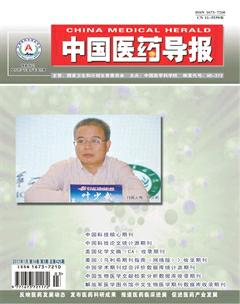脂类分子和皮质醇协同促进母乳喂养婴幼儿神经心理发育的研究进展
刘霞 庄太凤
[摘要] 母乳中含有多种对婴幼儿大脑发育起着重要作用的营养物质,这些营养物质对婴幼儿神经心理发育有促进作用,加强母乳喂养优越性及相关机制的研究是保证母乳喂养目标实现的重要基础。本文通过查阅文献,阐述了母乳中二十二碳六烯酸(DHA)和胆固醇等脂类分子的营养及体内皮质醇水平对婴幼儿神经心理发育的影响机理,旨在通过研究DHA、胆固醇营养和皮质醇水平协同促进母乳喂养婴幼儿语言和行为发育的机理,为母乳喂养促进婴幼儿神经心理发育提供新的思路和实证依据。
[关键词] 母乳喂养;脂类分子和皮质醇;协同促进;婴幼儿神经心理发育
[中图分类号] R17 [文献标识码] A [文章编号] 1673-7210(2017)01(c)-0060-04
[Abstract] Breast milk contains a variety of nutrients that plays an important role in the development of infants' brain, these nutrients would promote the infants' neuropsychological development. The research on strengthening breastfeeding superiority and related mechanism is an important foundation that guarantee to achieve the goal of breastfeeding. Though literature review, this paper shows the influence mechanism of infants' neuropsychological development by docosahexaenoic acid (DHA), cholesterol nutrition and other lipid molecules in the breast milk, and the cortisol level. It aims to provide new ideas and empirical evidence for breastfeeding to promote infants' neuropsychology development through studying DHA, cholesterol nutrition and cortisol level synergistically promote the development mechanism of breastfeeding of infants' language and behavior development.
[Key words] Breastfeeding; Lipid molecules and cortisol; Synergistic promotion; Infants' Neuropsychological development
许多医学专业组织如世界卫生组织、联合国儿童基金会、美国妇产科学院、美国儿科学会提倡母乳是婴儿喂养的金标准。8月1~7日是世界母乳喂养周,中国也将每年的5月20日定为“中国母乳喂养日”,大力提倡母乳喂养。目前我国母乳喂养率偏低,王燕等[1]对全国15个城市调查显示,城市0~6月龄儿童中纯母乳喂养率仅为31%,花静等[2]对我国西部农村地区调查显示,0~6月龄儿童中纯母乳喂养率仅为16.4%。近期卫生部资料显示,我国6个月内的婴儿纯母乳喂养率仅为30%。如何促进母乳喂养是妇幼营养和儿童保健领域當前所面临的一项重要课题与任务。加强母乳喂养优越性及相关机制研究是保证母乳喂养目标实现的重要基础。
1 国际母乳喂养与儿童神经心理发育研究进展
儿童神经心理发育包括大运动、精细动作、适应能力、语言和社交行为五大能区。儿童神经心理发育存在着明显的个体差异[3]。目前研究母乳喂养对儿童心理发育的影响多集中在对认知(智力)方面的影响,母乳喂养能够促进婴幼儿的智力及神经系统发育,白俄罗斯的一项大规模临床试验证实促进婴儿期母乳喂养可显著提高学龄儿童的智商和在学校里的阅读和写作成绩[4]。选择母乳喂养及延长母乳喂养时间可促进婴幼儿的智力发育,母乳喂养时间越长婴幼儿智力发育越高,一项澳大利亚大人群队列研究发现同母乳喂养时间少于6个月相比,母乳喂养时间在6个月以上可以明显提高10岁儿童在学校的学习成绩,这一影响对男孩更明显[5]。该研究同时还发现母乳喂养6个月以上可以显著降低儿童期和青少年期精神问题的发生率[6]。另一项西班牙的队列研究也显示母乳喂养可以增加14月龄儿童的贝利智力量表评分[7]。荟萃分析结果发现母乳喂养可使儿童智商增加3~5分[8]。母乳喂养与婴儿认知能力关系密切,目前有几项研究探索了母乳喂养对儿童心理发育其它维度(语言和行为气质发育)的影响,这些研究发现母乳喂养可能会促进婴儿对音节的识别和增加儿童皮博迪(Peabody)图片词汇测试分[9-11]。另一方面,英国的一项队列研究发现同人工喂养婴儿相比,母乳喂养婴儿外向性性格评分和自控能力评分可能较低,负面情感得分较高[12]。但目前在母乳喂养对儿童语言和行为气质发育的作用机理方面的研究尚属空白。母乳中二十二碳六烯酸(DHA)和胆固醇等脂类分子的营养物质以及皮质醇水平可能解释母乳喂养对儿童语言和行为气质发育的作用机理。
2 DHA与神经心理发育
母乳是婴儿(尤其是新生儿)的最佳食品,母乳富含各种生理活性物质,能提供婴儿全面、充足的营养,而且母乳可提供婴儿所必需、但体内又不能自身合成的多不饱和脂肪酸,它们对于婴儿的生长发育有着重要的意义,尤其是对婴儿中枢神经系统发育的作用越来越引起人们的重视。DHA是维持大脑正常发育所必需的脂肪酸,也是保证视力良好发育的重要功能成分。DHA是大脑发育与功能维持的必要物质,主要以磷脂酰乙醇胺和磷脂酰丝氨酸形式分布于脑细胞膜上。DHA占大脑干重的8%,占大脑脂质中脂肪酸的10%,n-3脂肪酸的95%[13]。DHA的主要功能是促进视网膜的成熟和视觉皮层的发育,丰富的DHA能够提高视觉灵敏度和促进大脑发育。DHA是胚胎期和生命早期动物与婴儿视觉功能良好发育所必需的脂肪酸,是维持正常视力的重要功能成分。DHA在视神经细胞及视网膜组织中的含量高达40%~47%,DHA的缺乏可影响视网膜电图,视觉诱发电位及视敏度。大脑白质、灰质、视网膜和其它神经组织含有丰富的DHA,其可影响婴儿的视敏度和神经发育[14-16]。多不饱和脂肪酸能够促进神经轴突、树突的形成。大脑海马区是学习记忆的关键部位,长时程增强、长时程抑制是海马突触可塑性的两种主要形式,与学习记忆密切相关,它的神经元的发育就显得尤为重要。脑中DHA缺乏还能干扰多种神经递质(如多巴胺、5-羟色胺)的代谢和脑细胞膜上酶和受体功能,进而影响神经形成、树突分支、突触形成和髓鞘形成[17-18]。动物研究发现DHA缺乏可引起前脑和海马功能缺陷[19]。由于多不饱和脂肪酸能够增进智力水平,提高学习能力,而摄入不足则能导致脑功能障碍。长期DHA缺乏会引起多巴胺源和5-羟色胺源神经传导异常,从而影响注意力和情感等行为[20]。母亲乳汁中DHA含量越高,就越有益于婴儿出生后大脑生长发育快速时期的需要,亚麻酸(ALA)是机体合成DHA的前体[21]。母乳是ALA和DHA的最佳来源之一,成熟乳中大约含有7 mg/dL的DHA。母乳基本上是母乳喂养婴儿前半年ALA和DHA的唯一来源[17]。前脑参与记忆及其伴随信息的处理。母乳喂养成长的儿童智商要显著高于配方奶粉喂养的儿童。母乳喂养婴儿前脑中DHA的含量和累积速度远高于同龄的配方喂养儿[22]。母亲从孕20周开始起每日补充800 mg DHA,结果显示DHA补充对27月龄幼儿工作记忆和儿童注意力的影响无统计学差异[23]。同多数孕期DHA补充实验结果相近,说明孕期机体可能通过自身调节来满足胎儿DHA需求。然而生后膳食DHA的供给是保证婴幼儿神经心理发育的必需物质基础。英国一项横断面调查提示血中DHA浓度与学龄儿童工作记忆和阅读能力呈正相关,与多动和焦虑等行为发育成负相关;即儿童血中DHA浓度低其工作记忆和阅读能力相对较差,易发生多动和焦虑等行为[24]。
3 胆固醇与神经心理发育
母乳中含有天然的胆固醇,它对于婴儿期的生长发育,尤其是大脑和神经系统的发育以及维生素D的生成,是必不可少的。大脑是胆固醇富集器官,含有人体20%左右的胆固醇,成人大脑约含35 g胆固醇[25]。胆固醇占大脑总重量的2%~3%,大脑脂质总重量的20%~30%。研究表明胆固醇是小鼠髓磷脂膜中必需成分,胆固醇在膜脂质中的比例超过了25%。角鲨烯合成酶是胆固醇合成过程中的限速酶。通过对角鲨烯合成酶(SQS)基因的条件突变,减少了小鼠少突胶质细胞中胆固醇的合成,能干扰髓磷脂的合成。结果显示少突胶质细胞中胆固醇参与脑白质的合成,是脑成熟的限速因子[26]。由于体内可以自身合成胆固醇,目前对“脑外源性胆固醇的供给对脑发育的重要性”这一观点尚存在一些争议。胆固醇可维持神经细胞的正常生理活动,和神经兴奋性有关,并参与大脑思维与记忆等智力活动。在脑细胞增殖和髓鞘形成时,发现胆固醇加速进入脑组织。小鼠实验显示胆固醇补充可以促进大脑髓鞘的形成。在小猪身上的研究发现增加胆固醇摄入可以提高脑胆固醇含量,进而影响其行为发育。在生后4~8周喂饲小猪低胆固醇膳食,其成年期大脑胆固醇浓度明显降低[27]。新近的证据显示外源性胆固醇对脑发育也同样重要[28]。给予大鼠含胆固醇膳可显著增加其大脑胆固醇含量[29-30]。Framingham心血管疾病研究发现成年期血清胆固醇水平高,其4年后的认知功能较好[31]。在婴儿阶段,机体已能合成胆固醇,而从母乳中有足够的供给,可有利于促进中枢神经系统的髓磷脂化。婴儿期,特别是生后最初的几个月是大脑快速发育的重要时期,为随后脑的生理和行为发育设定了轨迹[32]。胆固醇是母乳中另一个特有的脂类分子。母乳中胆固醇含量明显高于配方奶粉,母乳喂养婴儿血清胆固醇浓度也高于混合喂养婴儿[33]。目前配方奶粉尚不添加胆固醇,研究胆固醇对语言和行为气质的影响既有助于研究母乳喂养对语言行为发育的作用机制,还可以为优化配方奶粉组成,即是否需要添加胆固醇提供科学依据。
4 皮质醇与神经心理发育
此外,胆固醇在17α-羟化酶和11β-羟化酶等一系列酶作用下合成皮质醇。皮质醇是下丘脑-垂体-肾上腺轴中肾上腺分泌的一种终产物。主要参与应激反应控制,常作为评价应激反应的生理指标。近来一项研究发现应激反应(体液皮质醇水平)可能与执行功能和陈述性记忆等认知功能发育相关[34]。高水平皮质醇可能会延缓幼儿语言发育[35]。另一项研究发现母乳喂养婴儿的唾液皮质醇水平较非母乳喂养婴儿高40%左右[36]。母乳皮质醇水平与3月龄婴儿的负面情感呈正相关[37]。
综上所述,母乳喂养对婴幼儿神经心理发育有促进作用,母乳中含有多種对大脑发育起着重要作用的营养物质,选择母乳喂养及延长母乳喂养时间可促进婴幼儿的神经心理发育。DHA、胆固醇营养和皮质醇水平协同促进母乳喂养婴幼儿语言和行为发育的机理有待继续研究,通过研究为母乳喂养促进婴幼儿神经心理发育提供新的思路和实证依据。
[参考文献]
[1] 王燕,潘丽萍,王惠珊,等.城市婴幼儿家长营养与喂养现状及需求[J].中国儿童保健杂志,2011,19(6):515-517.
[2] 花静,吴擢春,邓伟,等.我国中西部地区农村纯母乳喂养影响因素研究[J].中国儿童保健杂志,2010,18(3):189-191.
[3] 金星明.规范发育行为儿科学专业术语[J].中华儿科杂志,2012,50(7):519-520.
[4] Kramer MS,Aboud F,Mironova E, et al. Breastfeeding and child cognitive development:new evidence from a large randomized trial [J]. Arch Gen Psychiatry,2008,65(5):578-584.
[5] Oddy WH,Li J,Whitehouse AJ,et al. Breastfeeding duration and academic achievement at 10 years [J]. Pediatrics,2011,127(1):137-145.
[6] Oddy WH,Kendall GE,Li J,et al. The long-term effects of breastfeeding on child and adolescent mental health:a pregnancy cohort study followed for 14 years [J]. Pediatr,2010,156(4):568-574.
[7] Guxens M,Mendez MA,Molto-Puigmarti C,et al. Breastfeeding,long-chain polyunsaturated fatty acids in colostrum,and infant mental development [J]. Pediatrics,2011,128(4):880-889.
[8] Michaelsen KF,Lauritzen L,Mortensen EL. Effects of breast-feeding on cognitive function [J]. Adv Exp Med Biol,2009, 639(1):199-215.
[9] Belfort MB,Rifasshiman SL,Kleinman KP,et al. Infant feeding and childhood cognition at ages 3 and 7 years:effects of breastfeeding duration and exclusivity [J]. AMA Pediatr,2013,167(9):836-844.
[10] Pivik RT,Andres A,Badger TM. Diet and gender influences on processing and discrimination of speech sounds in 3-and 6-month-old infants:a developmental ERP study [J]. Dev Sci,2011,14(4):700-712.
[11] Whitehouse AJ,Robinson M,Li J,et al. Duration of breast feeding and language ability in middle childhood [J]. Paediatr Perinat Epidemiol,2011,25(1):44-52.
[12] Bol LG,Wijndaele K,Clark M,et al. Breastfeeding and infant temperament at age three months [J]. PLoS ONE,2012,7(1):e29326.
[13] Muldoon MF,Ryan CM,Sheu L,et al. Serum phospholipid docosahexaenonic acid is associated with cognitive functioning during middle adulthood [J]. J Nutr,2010,140 (4):848-853.
[14] Uauy R,Hoffman DR,Mena P,et al. Term infant studies of DHA and ARA supplementation on neurodevelopment:results of randomized controlled trials [J]. J Pediatr 2003,143(4 Suppl):17-25.
[15] Drover J,Hoffman DR,Castaneda YS,et al. Three randomized controlled trials of early long-chain polyunsaturated fatty acid supplementation on means-end problem solving in 9-month-olds [J]. Child Dev,2009,80(5):1376-1384.
[16] Li J,Fan Y,Zhang Z, et al. Evaluating the trans fatty acid,CLA,PUFA and erucic acid diversity in human milk from five regions in China [J]. Lipids,2009,44(3):257-271.
[17] Innis SM. Dietary omega 3 fatty acids and the developing brain [J]. Brain Res,2008,1237(4):35-43.
[18] Peters BD,Duran M,Vlieger EJ,et al. Polyunsaturated fatty acids and brain white matter anisotropy in recent-onset schizophrenia:a preliminary study [J]. Prostaglandins Leukot Essent Fatty Acids,2009,81:61-63.
[19] Catalan J,Moriguchi T,Slotnick B,et al. Cognitive deficits in docosahexaenoic acid-deficient rats [J]. Behav Neurosci,2002,116(6):1022-1031.
[20] Schuchardt JP,Huss M,Stauss-Grabo M,et al. Significance of long-chain polyunsaturated fatty acids(PUFAs)for the development and behaviour of children [J]. Eur J Pediatr,2010,169 (2):149-164.
[21] Huffman SL,Harika RK,Eilander A,et al. Essential fats:how do they affect growth and development of infants and young children in developing countries?A literature review [J]. Maternal & child nutrition,2011,7(Suppl 3):44-65.
[22] Mcnamara RK,Able J,Jandacek R,et al. Docosahexaenoic acid supplementation increases prefrontal cortex activation during sustained attention in healthy boys:a placebo-controlled,dose-ranging,functional magnetic resonance imaging study [J]. Am J Clin Nutr 2010,91(4):1060-1067.
[23] Gould JF,Makrides M,Colombo J,et al. Randomized controlled trial of maternal omega-3 long-chain PUFA supplementation during pregnancy and early childhood development of attention,working memory,and inhibitory control [J]. Am J Clin Nutr,2014,99(4):851-859.
[24] Montgomery P,Burton JR,Sewell RP,et al. Low blood long chain omega-3 fatty acids in UK children are associated with poor cognitive performance and behavior:a cross-sectional analysis from the DOLAB study [J]. PLoS ONE,2013,8(6):e666-697.
[25] Orth M,Bellosta S. Cholesterol:its regulation and role in central nervous system disorders [J]. Cholesterol,2012, 2012(3):292598.
[26] Saher G,Brugger B,Lappe-Siefke C,et al. High cholesterol level is essential for myelin membrane growth [J]. Nat Neurosci 2005,8(4):468-475.
[27] Boleman SL,Graf TL,Mersmann HJ,et al. Pigs fed cholesterol neonatally have increased cerebrum cholesterol as young adults [J]. J Nutr,1998,128(12):2498-2504.
[28] Pfrieger FW,Ungerer N. Cholesterol metabolism in neurons and astrocytes [J]. Prog Lipid Res 2011,50(4):357-371.
[29] Scholtz SA,Gottipati BS,Gajewski BJ,et al. Dietary sialic acid and cholesterol influence cortical composition in developing rats [J]. J Nutr,2013;143(2):132-135.
[30] Haque ZU,Mozaffar Z. Importance of dietary cholesterol for the maturation of mouse brain myelin [J]. Biosci Biotechnol Biochem,1992,56(8):1351-1354.
[31] Elias PK,Elias MF,D'Agostino RB,et al. Serum cholesterol and cognitive performance in the framingham heart study [J]. Psychosom Med,2005,67(1):24-30.
[32] Andersen SL. Trajectories of brain development:point of vulnerability or window of opportunity [J]. Neurosci Biobehav Rev,2003,27(1-2):3-18.
[33] Harit D,Faridi MM,Aggarwal A,et al. Lipid profile of term infants on exclusive breastfeeding and mixed feeding:a comparative study [J]. Eur J Clin Nutr,2008,62(2):203-209.
[34] Blair C,Granger DA,Willoughby M,et al. Salivary cortisol mediates effects of poverty and parenting on executive functions in early childhood [J]. Child Dev,2011,82(6):1970-1984.
[35] Saridjan NS,Henrichs J,Schenk JJ,et al. Diurnal cortisol rhythm and cognitive functioning in toddlers:the Generation R Study [J]. Child Neuropsychol,2014,20(2):210-229.
[36] Cao Y,Rao SD,Phillips TM,et al. Are breast-fed infants more resilient?Feeding method and cortisol in infants [J]. J Pediatr,2009,154(3):452-454.
[37] Grey KR,Davis EP,Sandman CA,et al. Human milk cortisol is associated with infant temperament [J]. Psychoneuroendocrinology,2013,38(7):1178-1185.
(收稿日期:2016-10-09 本文編辑:李岳泽)

